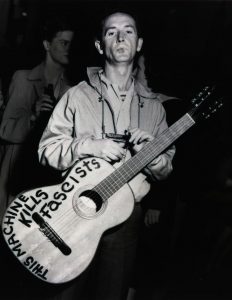This compelling documentary follows the primary campaigns of four progressive women who are not career politicians, but each, after seeing a need for change in their communities, decide to run for U.S. Congress in 2018. 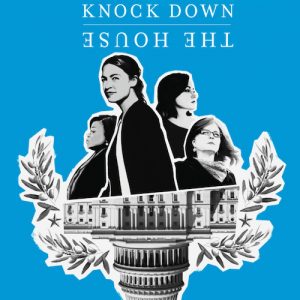 All four women are coming from powerful personal stories that compelled them to put themselves out there and run for office. While they each have their top issues they are fighting for based on their stories, this film does a good job illustrating the intersectionality of these issues as they disproportionately impact marginalized and working communities. The 2018 midterm elections saw record numbers of women and people of color who ran for and won seats—including the first-ever Native American women and Muslim women to serve in Congress. Even though Alexandria Ocasio-Cortez (also known as AOC) is the only one of the four featured in the film to succeed in her race, it is still inspiring to watch each of their journeys. And as AOC says herself, “For one of us to make it, a hundred of us have to try.”
All four women are coming from powerful personal stories that compelled them to put themselves out there and run for office. While they each have their top issues they are fighting for based on their stories, this film does a good job illustrating the intersectionality of these issues as they disproportionately impact marginalized and working communities. The 2018 midterm elections saw record numbers of women and people of color who ran for and won seats—including the first-ever Native American women and Muslim women to serve in Congress. Even though Alexandria Ocasio-Cortez (also known as AOC) is the only one of the four featured in the film to succeed in her race, it is still inspiring to watch each of their journeys. And as AOC says herself, “For one of us to make it, a hundred of us have to try.”
This documentary teamed up with the left-wing populist groups Justice Democrats and Brand New Congress, which are both focused on recruiting and supporting progressive outsiders to challenge corporate politicians. Largely born out of the momentum of Bernie Sanders’s people-powered 2016 Presidential campaign, these groups are working to address the political corruption of Washington D.C. and get money out of politics. Both groups back candidates that refuse financial contributions from corporations and billionaires in order to have politicians who will truly serve the interests of their constituents.
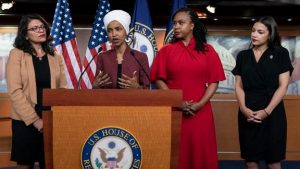
“The Squad”: From left-to-right, Rashida Tlaib (Michigan), Ilhan Omar (Minnesota), Ayanna Pressley (Massachusetts), and Alexandria Ocasio-Cortez (New York)
Brand New Congress is focused on recruiting working people and community organizers as a way of lifting the voices of the marginalized. Of the 31 candidates on their slate who trained together for the 2018 cycle, AOC was the only one to win.
The four women featured in this film were endorsed by both Justice Democrats and Brand New Congress. Even though they didn’t all win, each of these women inspired others by having the courage to step up for their communities. This film also does a good job highlighting some of the additional scrutiny women in politics have to constantly navigate—how they choose to dress and present themselves, how to use emotion without being accused of being too emotional or a bitch, and always having to prove their qualifications and credentials.
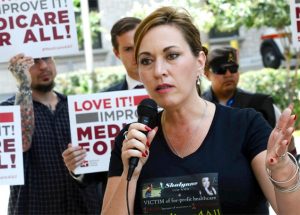 Amy Vilela decided to run in Nevada’s 4th congressional district after her daughter died from not being able to receive the health care she needed. Now her biggest fight is for Medicare for All. Amy’s story also includes her gratitude for the support of federal programs like WIC and food stamps when she was struggling as a single mother. She says she knows how to work with others, but makes it clear she is not willing to budge on universal healthcare.
Amy Vilela decided to run in Nevada’s 4th congressional district after her daughter died from not being able to receive the health care she needed. Now her biggest fight is for Medicare for All. Amy’s story also includes her gratitude for the support of federal programs like WIC and food stamps when she was struggling as a single mother. She says she knows how to work with others, but makes it clear she is not willing to budge on universal healthcare.
Cori Bush got her start as a community organizer through the Black Lives Matter protests in Ferguson, marching in the streets and providing medical assistance as a nurse after the violent response by the police. Cori decided to run in Missouri’s 1st congressional district—a predominantly black district—against Lacy Clay (who is also African-American). 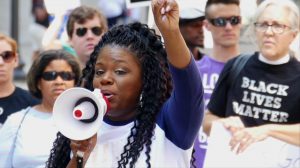 Lacy Clay has held the seat since 2001, after essentially inheriting it from his father, who had held the seat since 1969. Because of this, Cori is up against an extremely well-established political name, where voters election after election gravitate toward the familiar name. However, Cori makes the argument that, despite having a black representative for 50 years, police brutality is not being addressed and working families are still struggling with poverty in her district and across the nation. Cori lost her 2018 primary, but will be running again in 2020.
Lacy Clay has held the seat since 2001, after essentially inheriting it from his father, who had held the seat since 1969. Because of this, Cori is up against an extremely well-established political name, where voters election after election gravitate toward the familiar name. However, Cori makes the argument that, despite having a black representative for 50 years, police brutality is not being addressed and working families are still struggling with poverty in her district and across the nation. Cori lost her 2018 primary, but will be running again in 2020.
Paula Jean Swearengin organized previously with the Sierra Club and for Bernie’s 2016 campaign. As a daughter of coal miners, she has personally witnessed the devastation of the nature and communities of Appalachia as a result of intensive coal mining. She decided to run for Senator in West Virginia to call out how their representatives have turned their backs on their constituents in favor of the money from the coal industry. 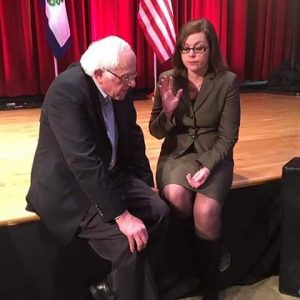 She hopes to fight for all of the people in her community who suffer or have died from cancer and black lung disease due to the harsh environmental conditions of working in or living near the coal mines. Her run was against incumbent Joe Manchin, who served as the Governor of West Virginia before moving over to the Senate in 2010. Manchin is a conservative Democrat who has voted against same-sex marriage and in favor of reducing access to abortion, has consistently supported coal and oil development, and received a “A” rating from the NRA. In her concession after the primary, she plainly reminded Manchin, “People are dying.” Paula Jean is running for Senate again in 2020, this time against a Republican incumbent.
She hopes to fight for all of the people in her community who suffer or have died from cancer and black lung disease due to the harsh environmental conditions of working in or living near the coal mines. Her run was against incumbent Joe Manchin, who served as the Governor of West Virginia before moving over to the Senate in 2010. Manchin is a conservative Democrat who has voted against same-sex marriage and in favor of reducing access to abortion, has consistently supported coal and oil development, and received a “A” rating from the NRA. In her concession after the primary, she plainly reminded Manchin, “People are dying.” Paula Jean is running for Senate again in 2020, this time against a Republican incumbent.
Alexandria Ocasio-Cortez, after running a truly inspiring campaign, won her primary against 20-year-incumbent Joe Crowley in the 14th congressional district of New York, which includes the Bronx and Queens. Crowley, like Lacy Clay, was essentially handed the seat through an arrangement with his predecessor. He hadn’t had a challenger since 2004 in a primary (which therefore means no real challenger given the solidly Democrat-leaning district). Serving as the House Democratic Caucus Chair in 2018, Crowley was the fourth-ranking House Democrat and set up to potentially be the next Speaker of the House. Given all of this, AOC’s 14-point win over him in the primary was a particularly huge upset victory. When people questioned AOC why they should vote for a newcomer instead of the incumbent who was rising up the ranks, she smartly poses the question, “And what is he using that power for?”
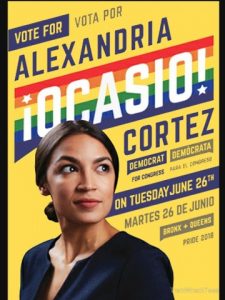 AOC attributes her politics to her Puerto Rican upbringing and her time spent at Standing Rock with the Dakota Access Pipeline protesters. She proudly references her time working as a waitress and bartender, saying it gave her the grit to work long days and an understanding of working people that most politicians seem to have lost touch with. Knowing that she couldn’t compete in regards to campaign financing (Crowley’s campaign was operating on a budget of over 20 times as much as AOC’s campaign), AOC ran a truly grassroots campaign that focused on going door-to-door to talk to voters and convince them that something other than the status quo is worth fighting for. AOC is an incredibly eloquent and passionate speaker. Throughout her campaign, she always clearly contrasted herself from Crowley and had a beautifully made ad that captured her story and what she stood for.
AOC attributes her politics to her Puerto Rican upbringing and her time spent at Standing Rock with the Dakota Access Pipeline protesters. She proudly references her time working as a waitress and bartender, saying it gave her the grit to work long days and an understanding of working people that most politicians seem to have lost touch with. Knowing that she couldn’t compete in regards to campaign financing (Crowley’s campaign was operating on a budget of over 20 times as much as AOC’s campaign), AOC ran a truly grassroots campaign that focused on going door-to-door to talk to voters and convince them that something other than the status quo is worth fighting for. AOC is an incredibly eloquent and passionate speaker. Throughout her campaign, she always clearly contrasted herself from Crowley and had a beautifully made ad that captured her story and what she stood for.
As the youngest woman to ever serve in the U.S. Congress, she brings fresh perspective as well as centers the concerns of the next generation in her bold calls for climate action, the defunding of ICE, campaign finance reform, and Medicare for All. AOC is particularly impressive and effective on social media and has used her platform to drastically change how we talk about what is possible.  In the film, there is a scene where she expresses her fear of being eaten by the machine of D.C. While some who canvassed for her from the beginning might be disappointed by some concessions that she has had to make, overall, I think AOC has done an incredible job of bringing her lived experience as well as those of her constituents to the table. AOC and her proposed Green New Deal for climate action have unfortunately been tremendously demonized by the right and moderate Democrats as some sort of socialist nightmare destroying the soul of our country. AOC is up for re-election next year for her seat in Congress, and I sincerely hope that she is able to keep doing good work and fighting for her constituents. I also hope Cori Bush and Paula Jean Swearengin are able to join her in 2020.
In the film, there is a scene where she expresses her fear of being eaten by the machine of D.C. While some who canvassed for her from the beginning might be disappointed by some concessions that she has had to make, overall, I think AOC has done an incredible job of bringing her lived experience as well as those of her constituents to the table. AOC and her proposed Green New Deal for climate action have unfortunately been tremendously demonized by the right and moderate Democrats as some sort of socialist nightmare destroying the soul of our country. AOC is up for re-election next year for her seat in Congress, and I sincerely hope that she is able to keep doing good work and fighting for her constituents. I also hope Cori Bush and Paula Jean Swearengin are able to join her in 2020.
AOC recently endorsed Bernie Sanders in the Democratic Primary out of the many candidates running for President in 2020. In her endorsement, she says that Bernie’s campaign helped her believe that she actually deserved better working conditions and that people like her could even run for office. AOC and Bernie both identify as Democratic Socialists. Democratic Socialism is about centering the universality of rights to housing and health care, building a mass movement that empowers people to work together for a better world, and demanding that Democrats have the guts to stand up to corporations that have been putting profits over people for too long.
When the four campaigns of this film were starting, they were all long-shots and it must have been a bit of a gamble for the director to decide which four races she was going to follow since it is hard to predict which ones would gain momentum. The director could not have asked for a better demonstration of the power of working people than with AOC’s upset victory against Crowley—who is such a perfect manifestation of the establishment, corporate Democrat machine. It is really great that this documentary was able to be there at the beginning of the journey and capture some of the momentum as it was starting to build.
This film aptly concluded with Sharon Jones’s soulful rendition of Woody Guthrie’s “This Land is Your Land.” This song is often used to patriotically celebrate the beauty of America, but this version includes some of the original stanzas that are often left out of white-washed versions of his song which question who is allowed to access this beautiful America. Woody Guthrie was a strongly anti-fascist folksinger, and the Woody Guthrie Center in Tulsa, OK carries on his legacy of working for social justice.
As I was walkingThey tried to stop me
They put up a sign that said
Private Property.
Well, on the back side, it read nothing.
So it must be that side was made for you and me.
One bright sunny morning
In the shadow of the steeple
Down by the welfare office
I saw my people.
As they stood hungry
I stood wondering,
If this land was made for you and me?

